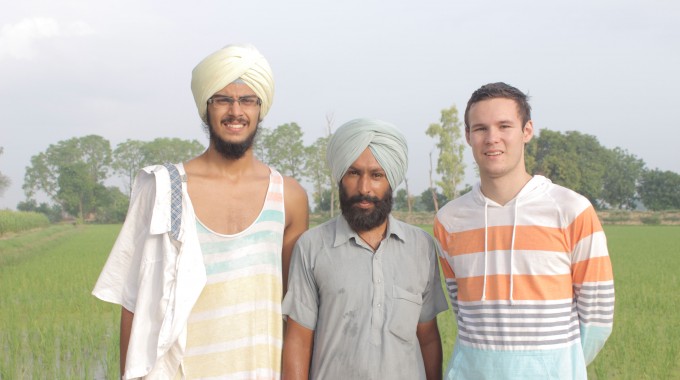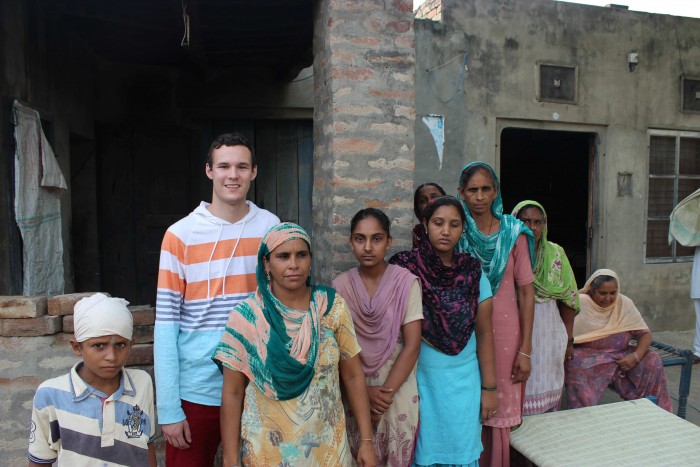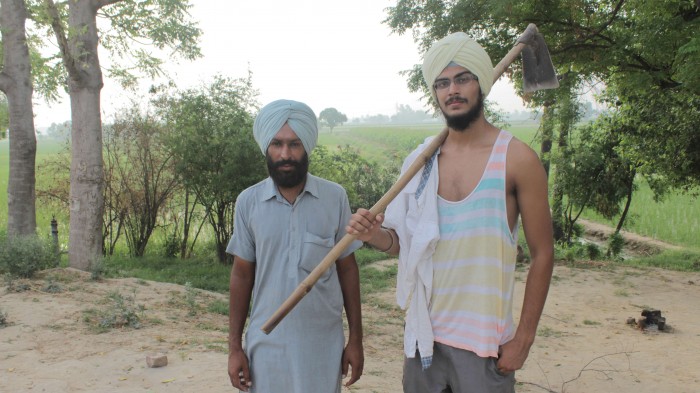If you know of a Columbia College student, faculty member, alumnus/alumna or program we should spotlight, or if you would like to submit a story, please contact:
Columbia College
Office of Communications
cc-comms@columbia.edu

Chris Canales CC ’14 and Angad Singh CC ’16 visited Punjab, India in the summer of 2013 to film a documentary about the region’s sustainability crisis and its impact on local communities.
The historically prosperous state of Punjab, situated in the northwest corner of India, is one of the country’s most fertile regions. Known as the “bread basket of India,” its soil is home to rolling fields of wheat, rice paddies and sugarcane plantations. But trouble lurks in paradise: Punjab suffers from an environmental crisis that is a result of the 1960s Green Revolution that brought mechanized agriculture, genetically modified seeds and chemical fertilizers to Punjab, and has today resulted in poor farming practices, excessive pesticide usage and a shrinking groundwater table.
This sustainability crisis captured the attention of Chris Canales CC ’14 and Angad Singh CC ’16, who filmed an original documentary in rural Punjab during the summer of 2013. Their film, compiled from interviews conducted with rural community members, agriculturists, and academics, provides a comprehensive overview of the crisis, with a focus on rural Punjabi youth, who will inherit the socioeconomic problems their families face due to the crisis: dependence on government subsidies, poor harvests and crippling debt.
“Punjab is considered the homeland of the Sikhs. As a Sikh-American, I feel strongly about these issues,” says Singh, who spent the summer of 2012 working with schools in the region.
 Chris Canales CC '14 with rural community members in Punjab. PHOTO: Angad Singh CC '16
Canales, a sustainable development major from El Paso, Texas, and Singh, a political science major from Atlanta, came up with the idea of the project in 2012 when Canales was a resident advisor on Singh’s floor in Carman Hall. “We were sitting around one day and talking about Punjab, and since we’re both into sustainable development and filmmaking, that turned into a project almost overnight,” said Canales, who has reported news and anchored for Columbia TV from 2010–13. “I felt a journalism void, and have wanted to explore long-form film for a while. For me, this project was right at the intersection of sustainable development and broadcast journalism.” Singh also had previous experience with film, having made documentaries which he had submitted to film festivals before coming to Columbia.
Chris Canales CC '14 with rural community members in Punjab. PHOTO: Angad Singh CC '16
Canales, a sustainable development major from El Paso, Texas, and Singh, a political science major from Atlanta, came up with the idea of the project in 2012 when Canales was a resident advisor on Singh’s floor in Carman Hall. “We were sitting around one day and talking about Punjab, and since we’re both into sustainable development and filmmaking, that turned into a project almost overnight,” said Canales, who has reported news and anchored for Columbia TV from 2010–13. “I felt a journalism void, and have wanted to explore long-form film for a while. For me, this project was right at the intersection of sustainable development and broadcast journalism.” Singh also had previous experience with film, having made documentaries which he had submitted to film festivals before coming to Columbia.
During the planning phase, the duo was mentored by members of the Columbia faculty, including Prabhjot Singh (of no relation to Angad), director of systems design at the Earth Institute and assistant professor of international and public affairs, and Alastair Ager, professor of population and family health at the Columbia University Medical Center. “Their subject has deep implications for how the world looks at the balance between great leaps forward and a truly sustainable development path,” says Professor Singh of the project. “Film is a powerful medium to convey the complexity of a multigenerational crisis without pretending that we have the answers.”
Sustain Punjab took two months of shooting on location, during which time Canales and Singh visited thirty towns and villages, interviewing academics at local universities, experts on the crisis, farmers and rural community members. “We didn’t stay in one location more than two days,” says Canales. Being in each rural community for such little time meant they had to work hard to connect with their interview subjects quickly — and creatively. Singh and Canales also featured local community members they met along the way in a music video about the traditional Sikh turban. Called Turban Shop, it was inspired by hip-hop sensation Macklemore’s performance of Thrift Shop at Bacchanal, and features Canales and Singh rapping original lyrics and wearing Sikh turbans along with local Punjabis in their hometowns.
The music video strives to generate a sense of Sikh cultural pride. “The Sikh identity is being lost to Western ideals, so when people saw a Sikh-American and a white American guy in a turban, they were excited to see their tradition reflected back at them,” says Singh. Angad Singh CC '16 (right) and Beant Singh, an organic farmer in the Bathinda province of Punjab. PHOTO: Courtesy of Angad Singh CC '16
Angad Singh CC '16 (right) and Beant Singh, an organic farmer in the Bathinda province of Punjab. PHOTO: Courtesy of Angad Singh CC '16
While the film is at the center of their 2013 project, Singh and Canales hope it will become a tool to create awareness about Punjab among U.S. audiences. “Our project isn’t just about a film. Our focus is the story of the youth of Punjab and the difficulties they face growing up. In the schools we visited, we met some really awesome kids who want to do something but don’t realize that they can,” says Singh, who hopes to get the ball rolling for a leadership development program in the schools. They are also looking into helping to place high schoolers at internships with local organizations, to give them the exposure they need to tackle the sustainability crisis that they will inherit.
By documenting a little-known crisis that is often overshadowed by larger, global environmental concerns, Sustain Punjab aims to reach an audience far beyond the local communities that the crisis has impacted. And for the sake of the young people of the agricultural communities, who stand to inherit a land besieged by so many problems, Canales and Singh hope that it succeeds in spreading its message.
Mihika Barua CC ’15, from Mumbai, is a student web editor for the Columbia College website. A political science major, she is also editor of Spectrum, the blog of the Columbia Daily Spectator.
Do you have a story you’d like to submit? Email columbiacollege@columbia.edu.